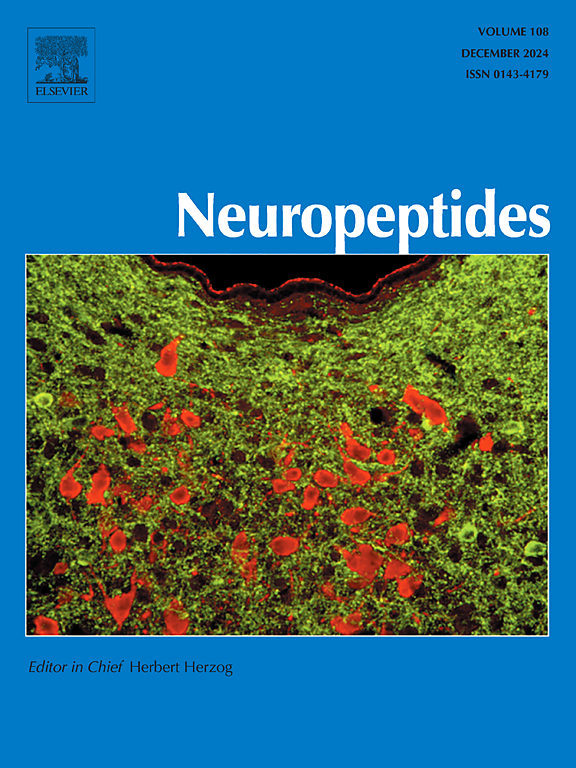抑制神经激肽B通过增加M2小胶质细胞促进外伤性脑损伤的功能恢复
IF 2.7
3区 医学
Q3 ENDOCRINOLOGY & METABOLISM
引用次数: 0
摘要
小胶质细胞分化为促炎M1和抗炎M2表型对于调节创伤性脑损伤(TBI)后的神经炎症和组织修复至关重要。M1/M2平衡决定神经预后,但控制这种极化的机制尚不清楚。本研究发现神经激肽B (NKB)是脑外伤中小胶质细胞M1/M2极化的一种新的调节因子。通过小鼠TBI模型,我们证实了NKB及其受体NK3R的显著上调。基因敲低NKB增强了功能恢复,并将小胶质细胞极化从有害的M1表型转移到有益的M2表型。相反,在小胶质细胞培养中,NKB可能通过抑制STAT6通路促进M1激活,同时抑制M2标记物。STAT6的过表达逆转了NKB对M2极化的抑制作用,而NK3R与SB222200的拮抗促进了M2极化并改善了功能结果。这些发现证实了NKB信号是脑外伤后小胶质细胞动力学的关键调节剂,表明靶向这一通路可能促进神经保护性M2极化,同时抑制损伤性M1反应。这种双重调节,结合改善的认知恢复,使NKB成为开发旨在调节神经炎症的新型TBI疗法的有希望的靶点。本文章由计算机程序翻译,如有差异,请以英文原文为准。
Inhibition of neurokinin B promotes functional recovery in traumatic brain injury by increasing M2 microglia
Microglial polarization into pro-inflammatory M1 and anti-inflammatory M2 phenotypes is critical for regulating neuroinflammation and tissue repair following traumatic brain injury (TBI). The M1/M2 balance determines neurological outcomes, yet the mechanisms governing this polarization remain unclear. This study identifies neurokinin B (NKB) as a novel regulator of microglial M1/M2 polarization in TBI. Using a murine TBI model, we demonstrated significant upregulation of NKB and its receptor NK3R. Genetic knockdown of NKB enhanced functional recovery and shifted microglial polarization from the detrimental M1 to the beneficial M2 phenotype. Conversely, NKB administration promoted M1 activation while suppressing M2 markers in microglial cultures, potentially through inhibition of the STAT6 pathway. Overexpression of STAT6 reversed NKB's suppressive effects on M2 polarization, while NK3R antagonism with SB222200 promoted M2 polarization and improved functional outcomes. These findings establish NKB signaling as a key modulator of microglial dynamics after TBI, suggesting that targeting this pathway may promote neuroprotective M2 polarization while inhibiting damaging M1 responses. This dual regulation, combined with improved cognitive recovery, positions NKB as a promising target for developing novel TBI therapies aimed at modulating neuroinflammation.
求助全文
通过发布文献求助,成功后即可免费获取论文全文。
去求助
来源期刊

Neuropeptides
医学-内分泌学与代谢
CiteScore
5.40
自引率
6.90%
发文量
55
审稿时长
>12 weeks
期刊介绍:
The aim of Neuropeptides is the rapid publication of original research and review articles, dealing with the structure, distribution, actions and functions of peptides in the central and peripheral nervous systems. The explosion of research activity in this field has led to the identification of numerous naturally occurring endogenous peptides which act as neurotransmitters, neuromodulators, or trophic factors, to mediate nervous system functions. Increasing numbers of non-peptide ligands of neuropeptide receptors have been developed, which act as agonists or antagonists in peptidergic systems.
The journal provides a unique opportunity of integrating the many disciplines involved in all neuropeptide research. The journal publishes articles on all aspects of the neuropeptide field, with particular emphasis on gene regulation of peptide expression, peptide receptor subtypes, transgenic and knockout mice with mutations in genes for neuropeptides and peptide receptors, neuroanatomy, physiology, behaviour, neurotrophic factors, preclinical drug evaluation, clinical studies, and clinical trials.
 求助内容:
求助内容: 应助结果提醒方式:
应助结果提醒方式:


